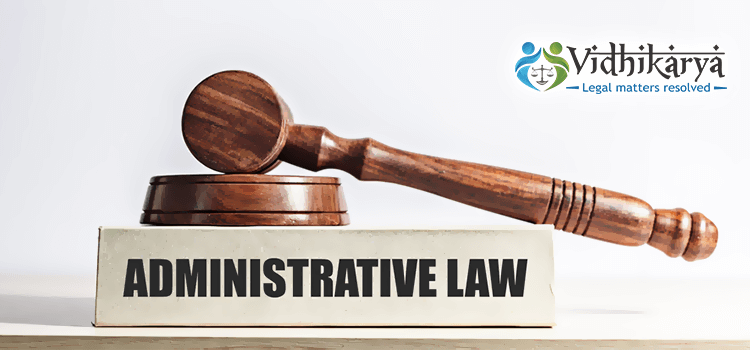What is Administrative Law?
Posted On : November 14, 2019

Table of Contents
The body of law and legal work that deals with government agencies is in essence, Administrative Law. Government agencies are created by Lawmakers so that these agencies, in turn, can create and implement fair and just laws enforcing regulations on all aspects of government functions.
Administrative law is a diverse area of law
Broadly administrative law is a comprehensive term inclusive of varied law categories. A lawyer practicing administrative law may never be in a courtroom. Conversely, an administrative lawyer of another type might be filing legal documents and arguing with judges in a formal backdrop for the most part. There are administrative lawyers interacting with people a lot while drafting documents is what yet another type of administrative lawyers do for the most part. The only criterion is the administrative lawyer actually doing government work or working with the regulations of the government.
Who practices administrative law?
Government Workers
Administrative lawyers are inclusive of public and private attorneys. Public attorneys function within a government agency with wide-ranging practice areas. Private attorneys, however, may work for a government agency as well on the basis of a contractual agreement instead of as an employee.
Working on behalf of private clients
Attorneys may practice administrative law on their private clients’ behalf. They may, for example, assist a client in the navigation of administrative procedures so as to ensure they successfully make a specific claim to an agency. In consultation with a client, a formal court proceeding may be initiated once administrative remedies are depleted. An administrative law attorney might be representing a private client for the sole purpose of challenging the constitutional validity of a regulation.
Types of administrative law practice
There are a wide variety of tasks that administrative lawyers perform with the duties varying extensively within each agency and even amongst certain duties within an agency. An administrative lawyer may typically do one or more of the following:
A well-documented law
An administrative lawyer might actually covert the orally accepted laws into written laws. These lawyers might have documented policies and procedures which are guidelines on executing specific aspects of the duties of an agency. If a case qualifies for hearing, a trial brief or a court motion may be prepared. When an attorney doubles up as an administrative law judge, they are empowered to draft opinions and judgments. The primary role of an administrative law attorney is drafting which might be all but one aspect of their duties.
Counseling for agency leaders
As and when top officials and agency leaders plan on making rules and regulations, they require attorneys to assist them in understanding the probable impacts of their decisions. They ought to know whether courts are inclined to upholding their regulations. Administrative lawyers can assist officials to give recommended regulations the proper consideration. On proposed regulations, they can evaluate public comments as well and provide guidance to officials according to public input.
Claims evaluation
Most administrative agencies have preset public procedures for making claims to the agency directly which are then evaluated by attorneys for confirmation on possible provisions of the law requiring the approval of claims and the associated risks.
Representing the agency at hearings
In most administrative agencies there is an appeals process of decision-making of an agency. In the vast majority of cases, this hearing begins within the agency by an agency judge and a decision is made prior to the case reaching the judicial branch of the court. An attorney at these administrative hearings may be the mouthpiece of the administrative agency; essentially an attorney who is an employee of the agency as well. Should the case progress to the courts over and above an internal hearing, administrative lawyers represent their respective agencies in court as usual.
Developing internal systems and processes of an organization
Government agencies require procedures for doing its work and therefore need forms, timelines and approved guidelines for their assigned tasks. Lawyers are involved to ensure that these policies and procedures are in sync with the legislative authority of the agency. They ensure that there aren’t any constitutional or due process considerations that the agency might have missed while implementing policy. What they do aids and abets the seamless functioning of their agency.
Administrative law judge
When an agency’s internal procedures for hearing are in place an administrative law judge hears and decides the case. These judges typically are attorneys entrusted with the vital task of listening to the evidence and making a decision.
Enforcement
Government Rules and regulations are made to be broken as they say by government agencies and inevitably, what that means is eventually someone actually violating the regulations. On instances of a violation occurring, there needs to be a procedure of identifying the violation and enforce its rules effectively. Administrative law attorneys level violation charges and pursue ways of enforcing the requirements of the agency.
Challenging administrative rules and regulations
To challenge the validity of an agency regulation a private person or corporation might want to bring a class-action lawsuit. They might even think that the agency wasn’t authorized by the legislature to form a particular regulation. Conversely, they may challenge on constitutional premise.
There might be disagreements in regards to an administrative law judge’s decision and the aggrieved may intend on challenging the decision by filing a lawsuit. Regardless of the circumstances, be it a person or corporation they typically hire their own administrative law attorney. Legal pleadings, presenting evidence and making arguments in a court of law on behalf of their clients.
?
Contact 7604047601 to consult with our registered expert administrative lawyers on Vidhikarya.
























